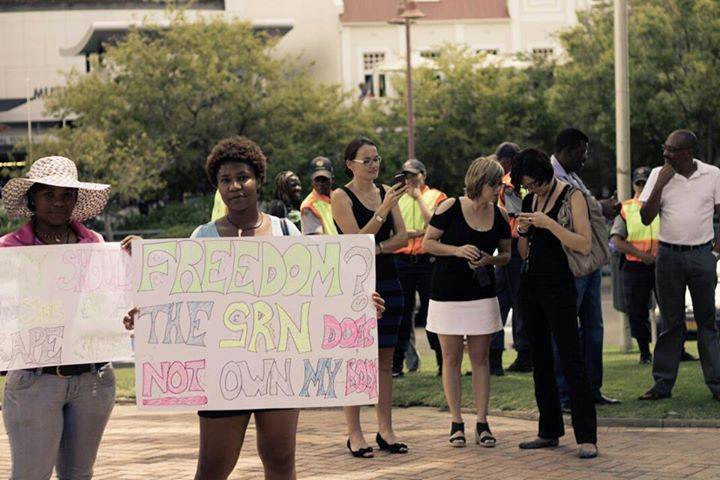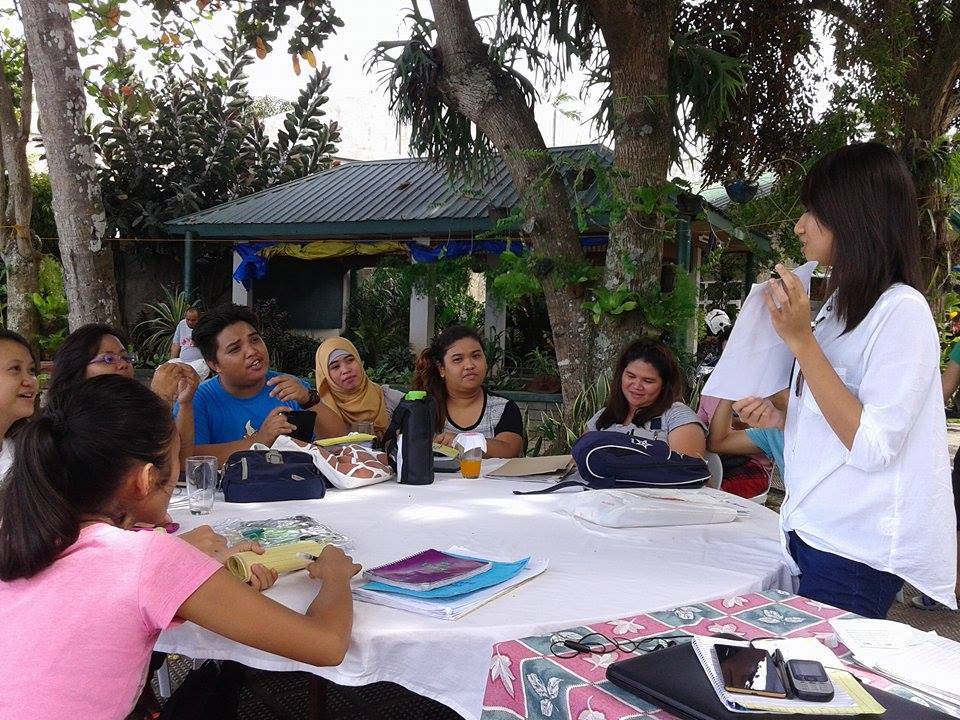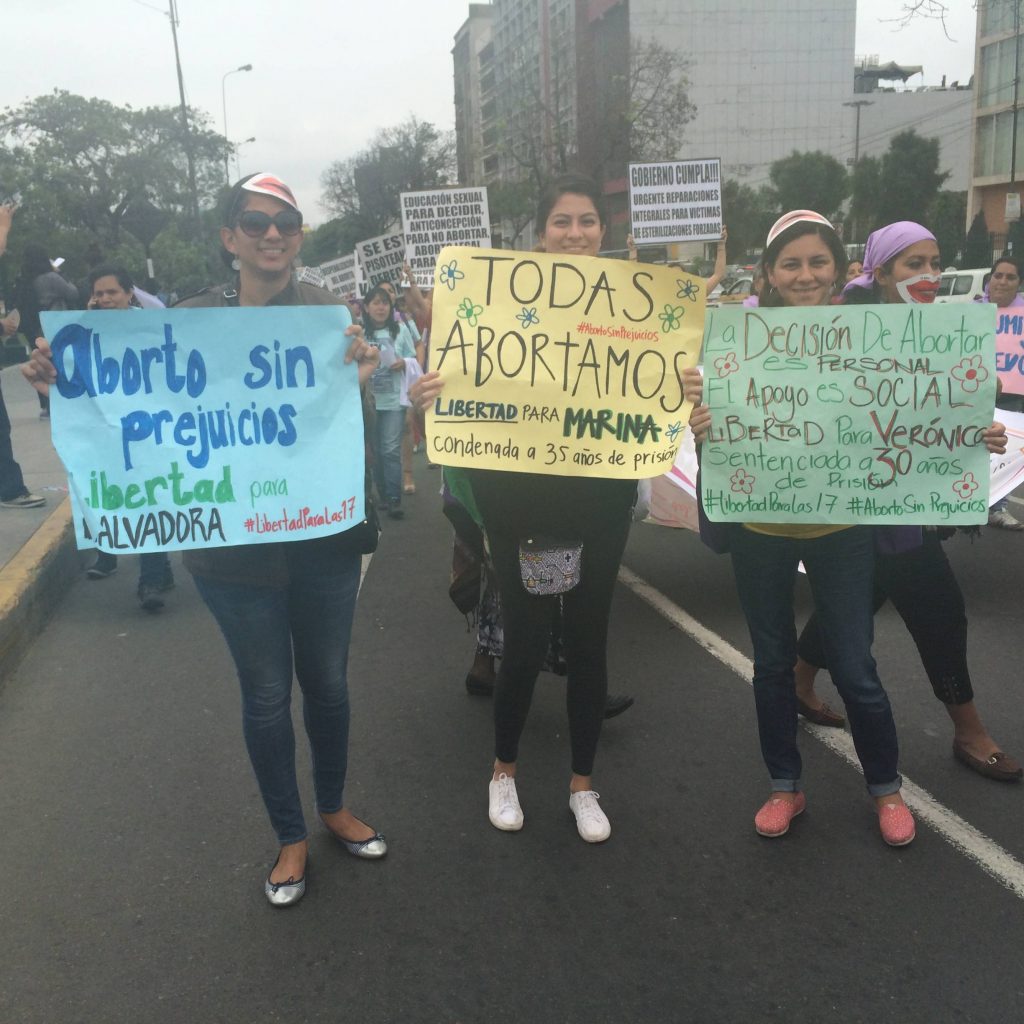By Ruby Johnson and Devi Leiper O’Malley, FRIDA Co-Coordinators
This piece was originally published on OpenDemocracy on 8 December 2014 for 16 Days of Activism Against Gender-Based Violence.
Fundamentalism is a root cause of multiple forms of violence experienced by young women and trans*youth worldwide. Young feminists human rights defenders are key actors in this space.

Young feminist activists protest arrests of miniskirt-wearing women, Namibia 2013. Image: (c) Young Feminist Movement Namibia
In the past month, attacks on women in Kenya have made international news. Videos of men stripping young women for wearing miniskirts went viral and prompted local and global outcry. Activists and bloggers were quick to point out that this violence is not isolated to Kenya, but a trend across the continent. Zoom out even further, and you see that this is a global problem that even got its own BuzzFeed List of all the times women and girls were told what not to wear this year.
As pointed out by Jessica Horn, the increased threat of violence and harassment by individual men to police these codes themselves is alarming, “as religious fundamentalist views and take hold and find their place not just in fringe extremists, but in capturing policies and actions of the state and, perhaps more worryingly, the popular imagination.”
Whether it is the way women and girls dress or having control over their own bodies more generally, women’s human rights have increasingly become the target of fundamentalist groups. In fact, more than 75% of women’s rights activists have observed an increase in the strength of religious fundamentalists, according to a study by the Association for Women’s Rights in Development (AWID).
A look at the state of sexual and reproductive rights in Latin America demonstrates the strength of religious fundamentalisms in shaping the realities of young women. Young women in Latin America live in a volatile context where they bodies and reproductive rights are constantly under battle. Young women are statistically the most affected, with high rates of teenage pregnancy, limited access to contraception and criminalization of abortion resulting in serious human rights violations and powerlessness.
The influence of religious fundamentalism in political decision-making is a common scenario, with church and religious thought leaders becoming increasingly involved in policy formulation and shaping public opinion. As outlined in AWID research “Fundamentalists have immense economic resources to manipulate awareness through the media and to appeal to the vulnerabilities created by poverty, fear and blame. They infiltrate decision-making positions in the executive, legislative and judicial branches, as well as in state and municipal governments, and this has allowed them to influence public policies and legislation.” In many cases such governments are progressive in their politics, but when it comes to SRR are lacking in leadership. One such example is Ecuador, just earlier this week the president of Ecuador delegated Monica Hernandez, a woman of Opus Dei faith, with a strong pro-life stance, as the National Manager of the National Intersectoral Strategy for Family Planning and Prevent Teen Pregnancy.
Young women have a unique perspective and role to play in filling gaps in information and services, as well as pushing the boundaries of the debate alongside other movement actors. Throughout Latin America young women led abortion hotlines have sprung up in the last 5-10 years, one such example is the hotline of Salud Mujeres, Ecuador, established in 2008: “As young feminist women, we provide information 365 days a year about access to contraception and medical abortions with misoprostol. Through our daily actions we aim to create another world where we are free to make informed decisions, and reflect without fear with love and empowerment despite the context of criminalization and violence. It is a strong and long fight because we live under a conservative government disguised as progressive. That is why we bring debate to the people, bring reflections to the streets, because this fight is for our right to choose.”
In resisting the rise of fundamentalism, it is important to recognize all its manifestations as well as interactions between different forms. We consider religious fundamentalism commonly in our conversation, but we are often blind to a different extreme ideology: economic fundamentalism.
For as long as we’ve been alive, market-driven neoliberal development has been the singular framework for ‘growth’ and ‘progress’. Yet strict and literal adherence to privatization, deregulation, and commercialization has only perpetuated inequality and worsened the lives of women, who make up 70% of the world’s poor. Not only does poverty and inequality support the promises of religious fundamentalists, neoliberal privatization strengthens their economic and social power by weakening the role of government and public services.
This is the context faced by the Young Feminist Organization (YFO), based in Mindanao, Philippines. For the past few decades, neoliberal policies and security forces of the Philippines government have supported the entry and growth of transnational mining and agricultural corporations. Displacement from ancestral land and pollution-induced health problems are regularly documented forms of violence against indigenous women in particular. This situation has fueled the growth of religious extremism in one of the world’s longest standing internal conflicts.

Young Feminist Organization holding a meeting in Iligan City, Mindanao, Phillippines. Image: (c) Young Feminist Organization
As a result of the instability and development injustice, many young women are forced to migrate and work in nearby cities, explains YFO. They become vulnerable to recruitment for employment in poor working conditions and traffickers. Young women are disadvantaged when government spends more on military and maintaining security rather than education and programs to address violence against women.
YFO consists of young women from indigenous communities, Muslim and Christian faiths, as well as LGBT youth. Seeking to change mindsets, the group educating and training young women and trans*youth to be a progressive cadre of leaders. Recruiting others to join their group is a challenge: “For most young people here, they have negative impression of activism and feminism. They think they are against the government, the norms, and culture.”
At the 58th Session on the Commission on the Status of Women (CSW), we witnessed delegations of conservative young women challenging speakers during sessions on sexual and reproductive health and rights. Their statements used the language of human rights (for religious freedom and the rights of the unborn) to argue against bodily integrity, reproductive choice, and access to accurate information and services. Speaking with a sense of legitimacy as the ‘youth voice’ on sexual reproductive rights, they were well prepared and organized.
Such well-equipped young women arriving at the CSW are symptomatic of a larger reality, where recruitment of youth is a key strategy of conservative forces. Savvy meida communications, smart phone apps, music concerts, and hip merchandise are all huge investments of fundamentalist groups targeting young people. Meanwhile, young feminist collectives working on progressive social justice issues remain under resourced and therefore underrepresented in key conversations and spaces. Resisting fundamentalisms takes a multi-faceted approach, especially because fundamentalist forces have successfully infiltrated decision-making positions and already hold large amounts of wealth.
In confronting fundamentalisms, we want to be sure that we aren’t fundamentalists ourselves “for the master’s tools will never dismantle the master’s house.” To be sure people of faith and alliances with religious groups play a key role in progressive social justice movements in local, national, and global contexts. Indeed, the work of feminists within religion is critical to creating a more pluralistic world that is respectful of different beliefs and cultures. Additionally, many young entrepreneurs are paving new ways of doing businessand presenting alternatives to a broken economic system that values all human lives, communities, and environments. Lastly, feminists themselves should be careful not to get stuck on what it means to be a ‘true feminist’ today. Whether you wear a miniskirt or trousers, let us embrace the current wave of multiple interpretations and diversity so that it makes us stronger as a movement, not weaker.
Fundamentalism has been on the rise for decades. Its systematic accumulation of wealth and power is already wreaking havoc on the world’s poor and marginalized, and it threatens to re-capture the ground that has been gained by hardworking social justice movements. Youth activists, especially young feminists, in all corners of the world are resisting and responding to complex forms of fundamentalism, using diverse strategies of social media, art, poetry, trainings, service provision, and legal advocacy. If we rally together with them and resource their work, we can hold the line and advance an agenda that will create a more just, diverse, and sustainable world for all.

